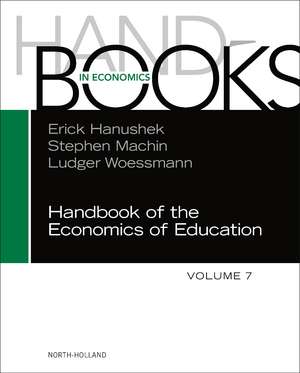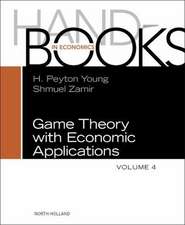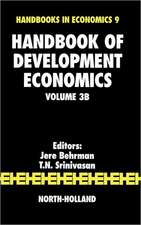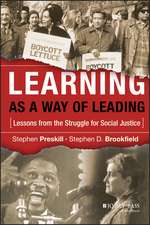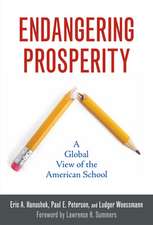Handbook of the Economics of Education: Handbook of the Economics of Education, cartea 7
Stephen J. Machin, Ludger Woessmann, Eric A. Hanusheken Limba Engleză Hardback – 25 oct 2023
By bringing together some of the world’s leading scholars, this volume provides a unique view of scholarship in the area. The international perspectives of the editors – Hanushek at Stanford, Machin at LSE, and Woessmann at Munich – leads to a volume with something for all researchers. Topics range from the economics of early childhood education to inequality in society to cash transfers in developing countries.
- Identifies and evaluates the state-of-the-art
- Includes clear descriptions of the meaning of existing research and the most likely avenues for the future
- Provides insights into how policy interventions in education can help or hurt human capital outcomes
| Toate formatele și edițiile | Preț | Express |
|---|---|---|
| Hardback (5) | 624.46 lei 5-7 săpt. | |
| Elsevier – 29 sep 2011 | 624.46 lei 5-7 săpt. | |
| ELSEVIER SCIENCE – 9 mai 2016 | 666.57 lei 5-7 săpt. | |
| ELSEVIER SCIENCE – 10 noi 2010 | 700.94 lei 5-7 săpt. | |
| ELSEVIER SCIENCE – 25 oct 2023 | 702.66 lei 5-7 săpt. | +172.44 lei 7-13 zile |
| ELSEVIER SCIENCE – 18 ian 2023 | 706.55 lei 5-7 săpt. | +177.14 lei 7-13 zile |
Preț: 702.66 lei
Preț vechi: 963.50 lei
-27% Nou
Puncte Express: 1054
Preț estimativ în valută:
134.49€ • 139.87$ • 112.70£
134.49€ • 139.87$ • 112.70£
Carte tipărită la comandă
Livrare economică 06-20 martie
Livrare express 06-12 februarie pentru 182.43 lei
Preluare comenzi: 021 569.72.76
Specificații
ISBN-13: 9780443132766
ISBN-10: 0443132763
Pagini: 520
Dimensiuni: 152 x 229 x 34 mm
Greutate: 1.27 kg
Editura: ELSEVIER SCIENCE
Seria Handbook of the Economics of Education
ISBN-10: 0443132763
Pagini: 520
Dimensiuni: 152 x 229 x 34 mm
Greutate: 1.27 kg
Editura: ELSEVIER SCIENCE
Seria Handbook of the Economics of Education
Public țintă
Anybody concerned with education research and human capital policy can quickly and definitively know what is known and gain insights into what is next. Researchers, graduate students, and users of research can all benefit from the clear and lucid discussionsCuprins
1. Methods for measuring school effectiveness
Joshua Angrist, Peter Hull and Christopher Walters
2. Teacher evaluation and training
Eric S. Taylor
3. U.S. school finance: Resources and outcomes
Danielle Victoria Handel and Eric A. Hanushek
4. College costs, financial aid, and student decisions
Susan Dynarski, Lindsay Page and Judith Scott-Clayton
5. Firm training
Dan A. Black, Lars Skipper and Jeffrey A. Smith
6. Multidimensional human capital and the wage structure
David J. Deming
Joshua Angrist, Peter Hull and Christopher Walters
2. Teacher evaluation and training
Eric S. Taylor
3. U.S. school finance: Resources and outcomes
Danielle Victoria Handel and Eric A. Hanushek
4. College costs, financial aid, and student decisions
Susan Dynarski, Lindsay Page and Judith Scott-Clayton
5. Firm training
Dan A. Black, Lars Skipper and Jeffrey A. Smith
6. Multidimensional human capital and the wage structure
David J. Deming
Recenzii
"2011 PROSE Award Honorable Mention for Economics"
"The increased importance of knowledge, skills, and information in the modern economy means that human capital and education will be even more important in the future than it has been during the past 50 years. ... The articles in these handbook volumes convey some of the excitement that continues in research on the economics of education." --Gary S. Becker, University of Chicago
"This important volume follows soon after volume 3, so together they provide up-to-date expert evaluations of the latest research findings on the economics of education, including some significant topics that are little discussed by economists. There are chapters on how psychological behavior affects economic decisions; the relation between educational achievement on one hand and criminal activity, good health, and political participation on the other; and the relation between education and the process of economic development. Other chapters address more familiar issues, such as education and migration, the use of school vouchers, overall school financing, and performance pay for teachers. One chapter considers an intriguing issue--whether there has been, or can be, over education. Most readers will appreciate the chapter on the determinants of college achievement. Each of the nine long essays comes with an unusually extensive bibliography. Of strong value for researchers and professional educators. Summing Up: Highly recommended. Upper-division undergraduate through professional collections." --CHOICE, August 2012, Vol. 49, No. 11, page 153
"The increased importance of knowledge, skills, and information in the modern economy means that human capital and education will be even more important in the future than it has been during the past 50 years. ... The articles in these handbook volumes convey some of the excitement that continues in research on the economics of education." --Gary S. Becker, University of Chicago
"This important volume follows soon after volume 3, so together they provide up-to-date expert evaluations of the latest research findings on the economics of education, including some significant topics that are little discussed by economists. There are chapters on how psychological behavior affects economic decisions; the relation between educational achievement on one hand and criminal activity, good health, and political participation on the other; and the relation between education and the process of economic development. Other chapters address more familiar issues, such as education and migration, the use of school vouchers, overall school financing, and performance pay for teachers. One chapter considers an intriguing issue--whether there has been, or can be, over education. Most readers will appreciate the chapter on the determinants of college achievement. Each of the nine long essays comes with an unusually extensive bibliography. Of strong value for researchers and professional educators. Summing Up: Highly recommended. Upper-division undergraduate through professional collections." --CHOICE, August 2012, Vol. 49, No. 11, page 153
